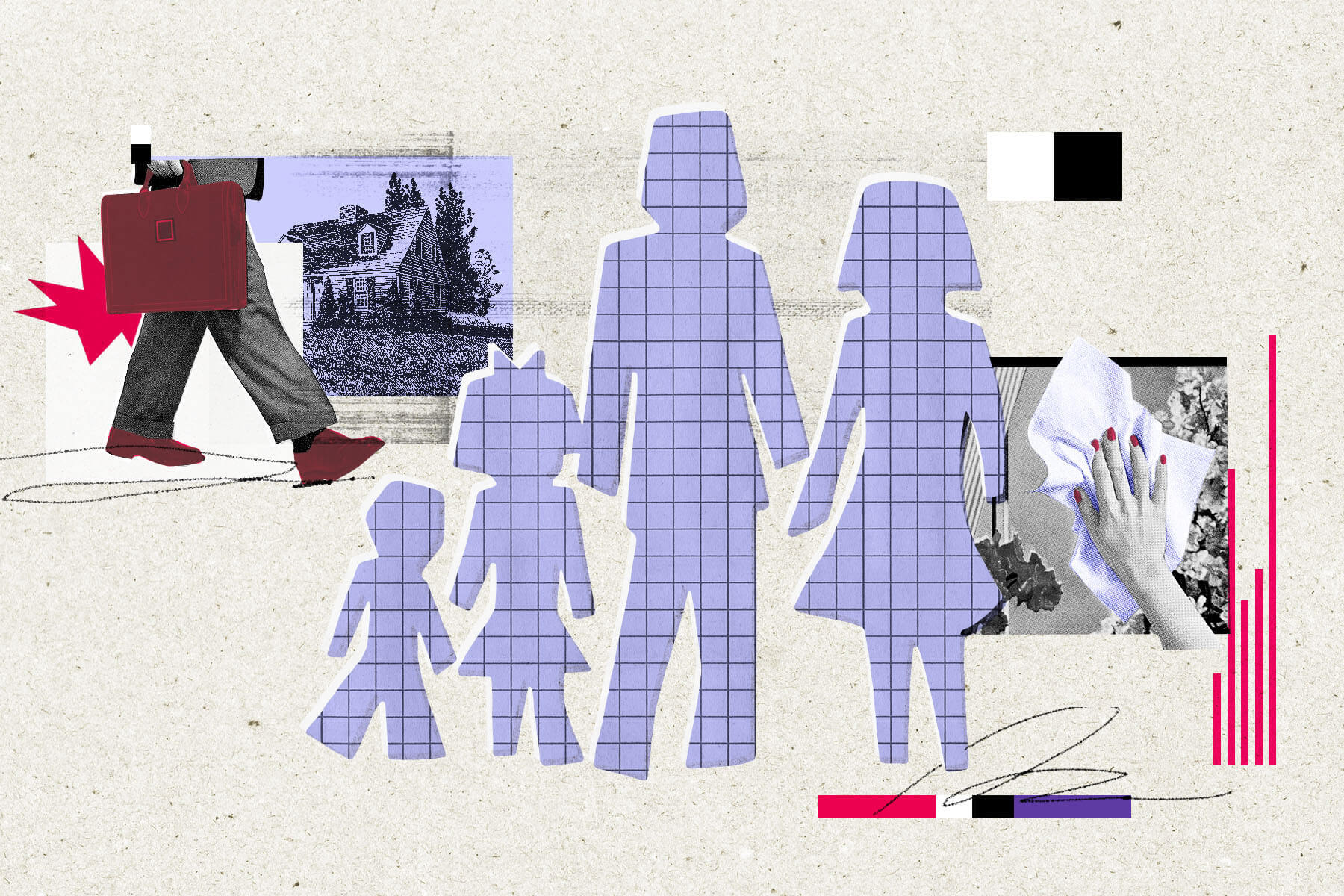
Your trusted source for contextualizing AmericaŌĆÖs core issues. Sign up for our daily newsletter to read future poll stories first, or donate today to support more projects like this.
Bill Jennings, a 69-year-old libertarian who lives in Daytona Beach, Florida, said his mother and wife both worked outside the home, but he has been impressed by the younger generation of women in his family who are homeschooling their children.
ŌĆ£Both parents should participate in raising children, but IŌĆÖm thinking more that the man is typically the breadwinner and the female is more focused on the home and raising children,ŌĆØ Jennings said. ŌĆ£I know it sounds old-fashioned.ŌĆØ
Half of respondents to a new 19th News/SurveyMonkey poll said they believe, like Jennings, that society would benefit from a return to traditional gender roles. Men were more likely than women to want a return to traditional gender roles, however ŌĆö nearly 6 in 10 of them agreed with that, compared with 4 in 10 women.
ŌĆ£IŌĆÖm not taking a hard line that ŌĆśthe womanŌĆÖs place is in the home,ŌĆÖ but I just think the traditional roles are generally better ŌĆö our traditional cultural, Western cultural roles are better for the family and for children,ŌĆØ Jennings said.
The new data on AmericansŌĆÖ views on gender roles comes amid the high-profile assassination of conservative influencer Charlie Kirk, who often argued to his audience of younger Americans that men should be providers and leaders in their homes, while young women should cherish marriage and children over careers. Erika Kirk, Charlie KirkŌĆÖs widow has vowed to carry forward her husbandŌĆÖs work as the CEO of the company he helped found.
While Gen Z men were less likely than men of older generations to agree at 54 percent, the gap between Gen Z men and women was 19 points, illustrating the ways in which younger Americans are diverging when it comes to culture and politics.
Women of both parties were less likely to support a return to traditional gender roles than men. Support for a return to traditional gender roles was highest among Republican men at 87 percent, followed by Republican women at 79 percent. Democratic women were the least likely to support a return to traditional gender roles ŌĆö 23 percent do, compared with 29 percent of Democratic men.
Another notable gender divide exists between men and women who are married and who are parenting. Married men support the premise at 62 percent, compared with fewer than half of married women at 47 percent. Sixty-seven percent of dads support a return to traditional gender roles, compared with 52 percent of moms.
Divorced men were most likely to think that society would benefit from a return to traditional gender roles at 67 percent. Women who have never been married were the least likely to agree at 37 percent.
SurveyMonkey conducted this poll online from September 8 to 15 among a national sample of 20,807 U.S. adults, with a modeled error estimate of plus or minus 1.0 percentage points.
Eve Rodsky, a lawyer specializing in organizational management who has become a prominent advocate for fair labor division in the home, said many Americans have long yearned for an idyllic ŌĆ£Leave it to BeaverŌĆØ lifestyle. The current rise in Christian nationalism being promoted by Republicans in power ŌĆö and on full display following the death of Kirk ŌĆö will only turbocharge those long-standing yearnings, Rodsky said.
ŌĆ£This idea of women being at home is so strong that I would have been shocked if I saw something different in the data,ŌĆØ said Rodsky, the author of ŌĆ£Fair Play,ŌĆØ a book and card game designed to guide couples through domestic divisions of labor. ŌĆ£It is in our lore.ŌĆØ
The survey showed stark religious divides: More than three-quarters of evangelical Christians ŌĆö 77 percent ŌĆö agree with a return to traditional gender roles, compared with 54 percent of non-evangelical Christians, 32 percent of Jewish people, and 15 percent of atheist or agnostic people.
The survey also asked Americans whether or not they agree with the statement, ŌĆ£Families are better off when one parent stays home with the children.ŌĆØ A net 63 percent of Americans agreed, including 69 percent of men and 58 percent of women.
Holly Ann Zuercher, a 71-year-old Republican in Florida, also responded to the survey and said at least one parent should stay home for the sake of the children. She said she and her sister were raised in a home with a dad who worked full-time and a mom who stayed home full-time for about a decade before returning to work part-time.
ŌĆ£A lot of our kids have gone off the rails because they donŌĆÖt have proper parenting. The parents are too busy and donŌĆÖt have time to devote to help teach the children all the values and things they should be teaching them,ŌĆØ Zuercher said. ŌĆ£And on the weekends, theyŌĆÖre so tired taking care of things around the house and the kids donŌĆÖt get the quality time with parents that they should get.ŌĆØ
Zuercher acknowledged that rising costs have made it difficult for many families to make ends meet without both parents working full-time. She herself went back to work when her daughter was less than 2 years old but was able to leave her with a good friend who was a stay-at-home mom.
ŌĆ£IŌĆÖm not sure if thereŌĆÖs a policy that would fix the situation or make it better: Things are expensive, housing and child care,ŌĆØ Zuercher said. ŌĆ£There isnŌĆÖt always a grandparent that can take over and the influence of some teachers doesnŌĆÖt really go with the ideals of parents. Kids are suffering.ŌĆØ
Both Jennings and Zuercher were among the 66 percent of those who say itŌĆÖs better for a parent to stay home with children ŌĆö including majorities of men, women, Republicans and Democrats ŌĆö who said whichever parent wants to stay home should be the one to stay home.
Those views appear to conflict with the large share of Americans who want a return to traditional gender roles, where the woman is the primary caretaker of children.
ŌĆ£ItŌĆÖs difficult to say in every instance that the mother should be the primary person to stay at home,ŌĆØ Jennings said, adding that ŌĆ£by and large, thatŌĆÖs the case.ŌĆØ
Rodsky said that given the realities of women in the workforce ŌĆö occupational segregation, lack of paid leave, the pay gap between men and women, for example ŌĆö Americans who say either parent can stay in the home are likely doing so with the assumption that, more often than not, in heterosexual couples, it will be the woman.
ŌĆ£I think you can say women without having to say women,ŌĆØ Rodsky said. ŌĆ£ItŌĆÖs almost always going to be women.ŌĆØ
AmericansŌĆÖ yearning for a return to traditional gender roles is crucial to understanding why the United States lags behind other wealthy countries in policies like paid parental leave and universal child care. ŌĆ£ItŌĆÖs going to be very, very hard to implement policies that buck that aspirational trend,ŌĆØ she said.
Rodsky said that traditional gender roles, or gender specialization, while an ideal for many Americans, particularly men, is out of reach for more than two-thirds of families because of income inequality, which is only growing.
Kaylia Artis, a 24-year-old from Virginia, said her husband wants her to stay home full-time to watch their children, ages 2 and 6. But she works as a nurse at a hospital and is employed in another part-time retail role, and she said the family cannot afford for her to stop working. Not to mention, she said, she really enjoys it.
ŌĆ£The way things are changing, we both need to be working because we got to be able to pay the rent, the lights, the water, the gas, anything the kids might need, the car,ŌĆØ Artis said. ŌĆ£But my husbandŌĆÖs telling me heŌĆÖd prefer me to just cook, clean, do everything at home. And IŌĆÖm like, respectfully, IŌĆÖm just not that kind of woman.ŌĆØ
Artis believes whichever parent wants to stay home should. But in her specific situation, Artis said she canŌĆÖt imagine her husband taking over all of the household duties from her.
ŌĆ£Women are being asked to do too much and take on everything,ŌĆØ Artis said. ŌĆ£Us moms are the main ones taking sacrifices for our kids. ItŌĆÖs mainly us women that are leaving or quitting jobs or have to leave work early or have to change our hours a certain way to get the kids or take them to school. WeŌĆÖre making the kidsŌĆÖ appointments, going to the schools and participating in everything.ŌĆØ



